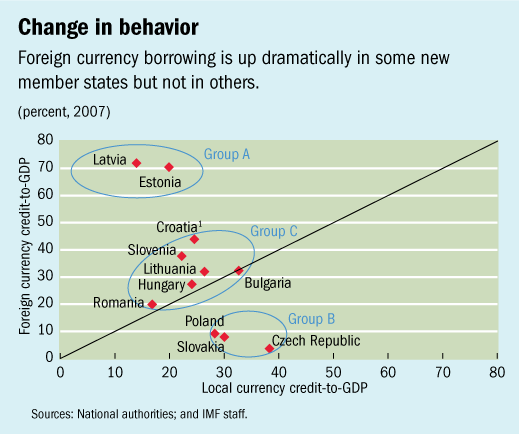
Typical street scene in Santa Ana, El Salvador. (Photo: iStock)
IMF Survey: Foreign Currency Borrowing More Risky for Eastern Europe
October 28, 2008
- Foreign currency borrowing raises region's exposure to banking crisis
- EU membership may boost confidence in exchange rate stability
- Cross-border regulatory cooperation needed to cut currency risk
Europe's emerging markets are increasingly exposed to currency risk, heightening these countries' exposure to the banking crisis that is currently sweeping across Europe, and raising the alarm among those concerned with financial stability.

European Union flags: IMF research indicates EU membership increases people's willingness to assume currency risk (photo: Dimitar Dilkoff/AFP)
EUROPE'S EMERGING MARKETS
New research by the IMF shows that 15 percent of outstanding private sector credit in Eastern Europe today is either denominated in or indexed to foreign currencies, compared with only 4 percent a decade ago. Euroization (taking out loans in euros rather than the local currency) has also accelerated, adding to the risks.
Reasons for changed behavior
Why are borrowers and lenders switching from local currencies to euros and Swiss francs? New research by the IMF shows how economic incentives interact with country-specific characteristics, leading to striking differences between the new member states that joined the EU in 2004 (see chart).

Four main factors explain why East European households and companies are now switching to loans in euros and Swiss francs.
• The difference in interest rates between domestic and euro zone interest rates drives foreign currency borrowing, as suggested by economic theory. But unlike other parts of the world (for instance, Latin America), past exchange rate volatility has no statistically significant effect. One reason may be that EU membership increases people's willingness to assume currency risk. If anything, people expect their currencies to further appreciate as their countries converge towards Western European price and income levels. The currency regime per se or membership in the Exchange Rate Mechanism—the EU's antechamber to euro adoption—have no measurable impact.
• The banking sector's dependence on foreign capital, as measured by the loan-to-deposit ratio, is a strong contributor to foreign currency borrowing. Banks refinance themselves abroad and then pass on the currency risk to their clients, if only because they often are not allowed to hold open currency positions. It is irrelevant whether such foreign funding is channeled through domestic banks borrowing abroad (for instance, through syndicated loans) or through foreign-owned banks drawing on credit lines from their parent banks.
• Openness, captured by the relative size of foreign trade, matters also. Revenues from abroad make it easier for companies to hedge their foreign currency exposure. However ,this does not seem to be the case for households—remittance flows do not seem to increase foreign currency borrowing.
• Regulatory policies (for instance, higher risk weights for foreign currency loans) have some measurable effect, but it is pretty weak. The impact of such policies disappears entirely if direct borrowing from abroad is included. This illustrates that regulations imposed by domestic supervisors are largely ineffective if borrowers have direct access to lenders abroad, as is the case within the EU.
In sum, foreign currency borrowing is a by-product of EU membership. First, by fully liberalizing the capital account, the EU offers borrowers increased access to foreign funding, both through domestic banks affiliated with foreign parents and directly from abroad.
Second, by increasing trade openness, the EU provides hedging opportunities, especially for the corporate sector. Finally, EU membership seems to boost the private sector's confidence in exchange rate stability and imminent euro adoption, making devaluation seem like a low probability.
Protecting against risk
As Europe's policymakers ponder the need for stronger bank regulation and shared rules in the wake of the current banking crisis, the EU's new member states should seek to quickly implement measures that will reduce the risk associated with unhedged foreign currency exposure.
Regulation should be tailored to the new playing field created by the EU and should seek to steer borrowers and lenders away from currency risk, at least until the new member states adopt the euro and currency mismatches largely disappear.
As the IMF's research shows, regulatory measures have limited effect, at least for corporate lending, because access to foreign financing directly from abroad makes it easy to circumvent them. And because capital account restrictions are not an option under EU law, any measure to address foreign currency exposures will require ever closer cooperation between supervisors in home and host countries. In that sense, the crisis presents Central and Eastern Europe with an opportunity to improve financial stability in a coordinated manner, working closely with their counterparts in Western Europe.
Comments on this article should be sent to imfsurvey@imf.org


